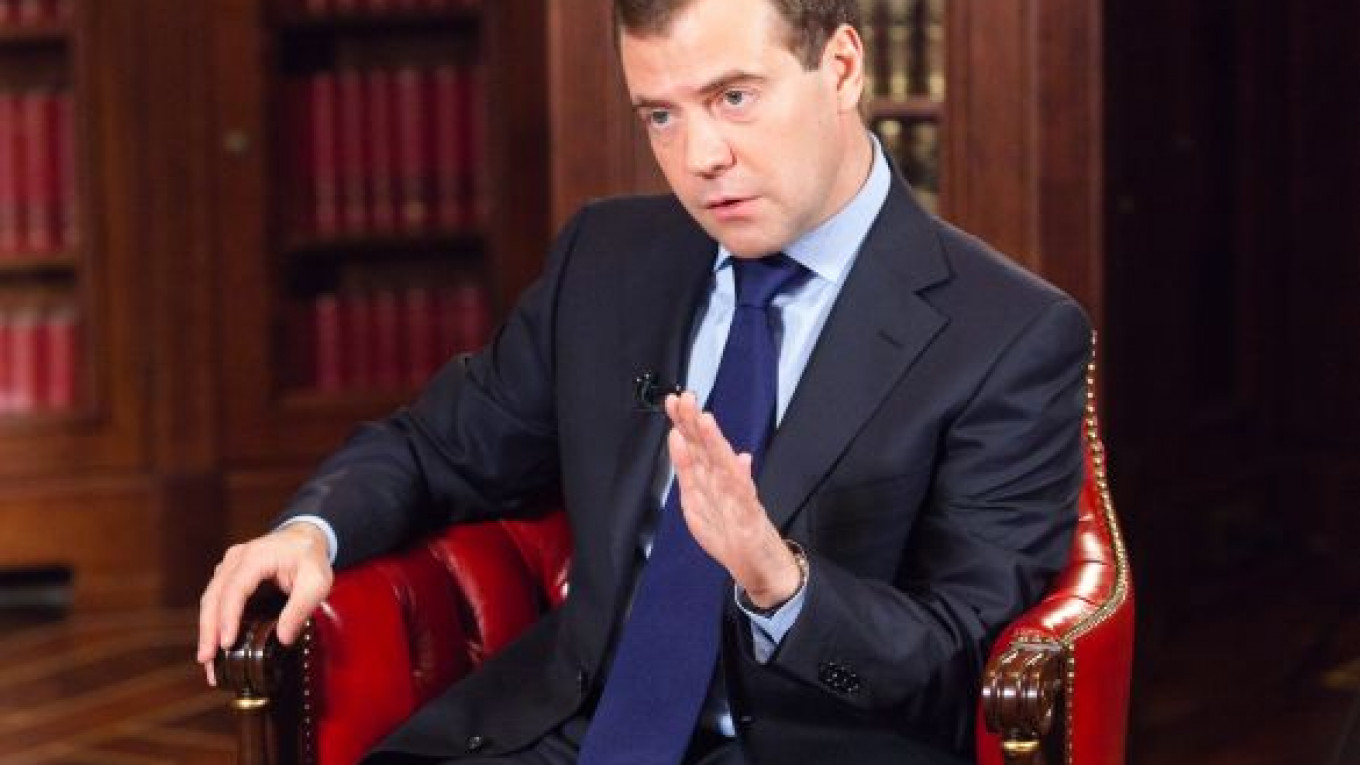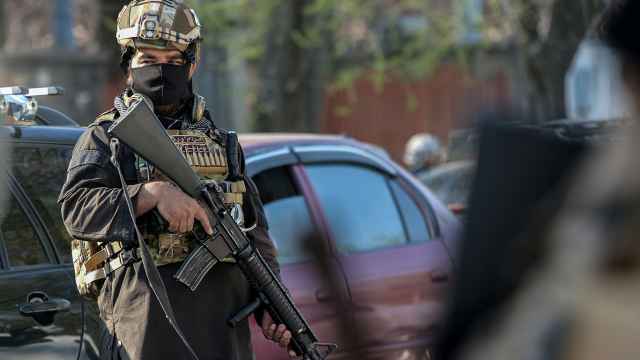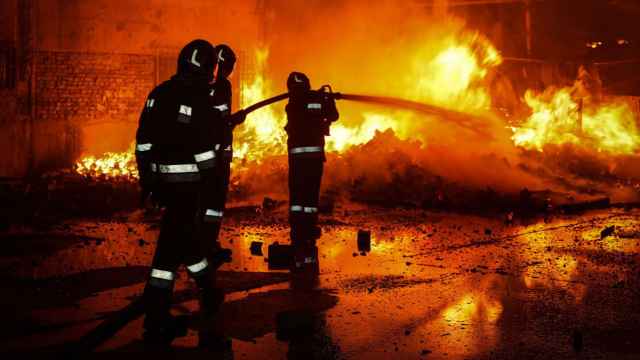Prime Minister Dmitry Medvedev, also the leader of United Russia, said Saturday at the ruling party's 14th congress that it had reasserted its position, though President Vladimir Putin's absence at the event prompted analysts to paint a more pessimistic picture.
Putin met with some United Russia members in the run-up to the congress on Oct. 3 but did not attend the main event itself, triggering speculation that he is distancing himself from the party.
Some analysts have argued that Putin's actions and many United Russia politicians' reluctance to showcase their affiliation with the party in recent elections were proof of the party's declining popularity.
But Medvedev provided a much more upbeat assessment, saying the party's results in the Sept. 8 regional races, which were stronger than those in the December 2011 State Duma election, demonstrated that it had managed to "rebuild the population's trust.
Despite the serious issues on the agenda, the prime minister appeared to be in a jovial mood and made frequent jokes at the event.
"Let's talk about life," Medvedev said at the beginning of the congress. "Who is in favor of starting our work? Those who are against it may leave and take a rest."
The recent regional elections "proved that United Russia is the most trusted and highly esteemed of all political forces," he said.
The results of United Russia in most regional legislative elections held in September were better than those in the December 2011 State Duma elections in relevant regions. The improvement was partially offset, however, by Civil Platform representative Yevgeny Roizman's election as mayor of Yekaterinburg, opposition leader Alexei Navalny's unexpectedly high percentage in the Moscow mayoral race and the Patriots of Russia getting a majority in the Krasnoyarsk city council.
Nevertheless, Medvedev said, victory was taken despite "record competition" with a bigger number of parties.
The number of registered parties soared in this year's elections as a result of a reform carried out in 2012. But critics have argued that most of the new parties are "fakes" that still answer to the Kremlin, while real opposition parties are refused registration.
State Duma Speaker Sergei Naryshkin echoed Medvedev's assessment of the elections, however.
"Those who spoke of the illegitimacy of the parliament have failed," he said, adding that the results of the regional elections confirmed his words. But a new wave of "destructive attempts" to question the legitimacy of the parliament cannot be ruled out, he said.
The opposition has repeatedly said the parliament is illegitimate because of purported large-scale fraud during the State Duma election in December 2011, which triggered an unprecedented wave of protests, and called for dissolving the parliament's lower house.
Alexander Motovilov, head of United Russia's executive committee in the Chelyabinsk region, told The Moscow Times that United Russia leaders were shocked when the party's rating started to fall in 2011.
He said the party subsequently saw a resurgence thanks to what he believes to be its main achievements — including, for example, efforts to aid the victims of flooding in the Chelyabinsk region in August. United Russia's decision to introduce primaries, which helped single out the most popular candidates, was another reason for its increased ratings, he added.
"What does not kill you makes you stronger," Motovilov said.
But Arkhangelsk Mayor Viktor Pavlenko was more cautious in his assessment, saying Roizman's election as mayor of Yekaterinburg and Navalny's strong showing in Moscow should serve as a warning to the ruling party. He suggested paying closer attention to some of their ideas.
He also called for dialogue between the government and the opposition. Rather than cracking down on the opposition, he said, United Russia should outdo its opponents through "real deeds," he said, using the party's motto, and incidentally a phrase that landed him in hot water in 2005, when he was ousted for mocking it. At that time, he substituted "a party of real deeds" with "a party of real jeeps," in reference to the large number of luxury cars owned by party members. He was later reinstated.
Several United Russia members at the congress displayed a conciliatory stance toward the opposition, telling The Moscow Times that an amnesty for some of the Bolotnoye case suspects would be reasonable. The case stems from an opposition rally in May 2012 that ended in violent clashes between protesters and police.
Pavlenko said the amnesty should not be applied to the organizers of the protests, though it could be applied to ordinary protesters, while Motovilov said the measure would be possible for those who were not involved in violence. A United Russia member, who gave his name as Leonid, also said an amnesty should not be ruled out, but Marat Islamov, head of the party's Kurgan region executive committee, declined to comment on the amnesty and said the matter should be left up to the courts.
Nina Kudashova, the little-known head of a minor party branch in Moscow, came into the limelight at the congress when she was elected as chairwoman of the party's Central Control and Revision Committee, replacing Vladimir Pekhtin. She told Putin at a meeting Thursday that there were rumors about him distancing himself from the party, and that these rumors were offensive to party members.
Her predecessor, Pekhtin, quit the State Duma in February after Navalny released evidence that the United Russia heavyweight allegedly co-owned undeclared property worth more than $2 million in Florida.
United Russia members voted for Kudashova's election and all other motions unanimously, with no discussion, causing some observers to draw parallels between the current ruling party and the Communist Party of the Soviet Union.
During the voting, Medvedev continued speaking in his light-hearted manner.
"Do I need to read all of this? I guess not; all of us have learned to read," he quipped when putting one of the motions to vote.
Medvedev also dealt with major economic issues at the event.
He said United Russia should be business-friendly and proposed introducing tax holidays for small businesses.
"Honest entrepreneurship is an expression of personal talent," he said. "We support the interests of various social groups, but we should not be ashamed to be a party of entrepreneurs."
Similar to recent proposals by Navalny, Medvedev called for increasing control over soaring utilities prices and proposed abolishing self-regulation in the housing and utilities sector and introducing licensing.
Medvedev also used some tough rhetoric on illegal immigration, echoing Putin's call for tightening migration law on Thursday.
"We should not allow ethnic enclaves to emerge, especially in big cities," he said.
Immigration has recently become a highly popular topic among politicians as anti-migrant sentiment is rising, with candidates in the Sept. 8 Moscow mayoral race making the subject a top priority.
Contact the author at o.sukhov@imedia.ru
A Message from The Moscow Times:
Dear readers,
We are facing unprecedented challenges. Russia's Prosecutor General's Office has designated The Moscow Times as an "undesirable" organization, criminalizing our work and putting our staff at risk of prosecution. This follows our earlier unjust labeling as a "foreign agent."
These actions are direct attempts to silence independent journalism in Russia. The authorities claim our work "discredits the decisions of the Russian leadership." We see things differently: we strive to provide accurate, unbiased reporting on Russia.
We, the journalists of The Moscow Times, refuse to be silenced. But to continue our work, we need your help.
Your support, no matter how small, makes a world of difference. If you can, please support us monthly starting from just $2. It's quick to set up, and every contribution makes a significant impact.
By supporting The Moscow Times, you're defending open, independent journalism in the face of repression. Thank you for standing with us.
Remind me later.






